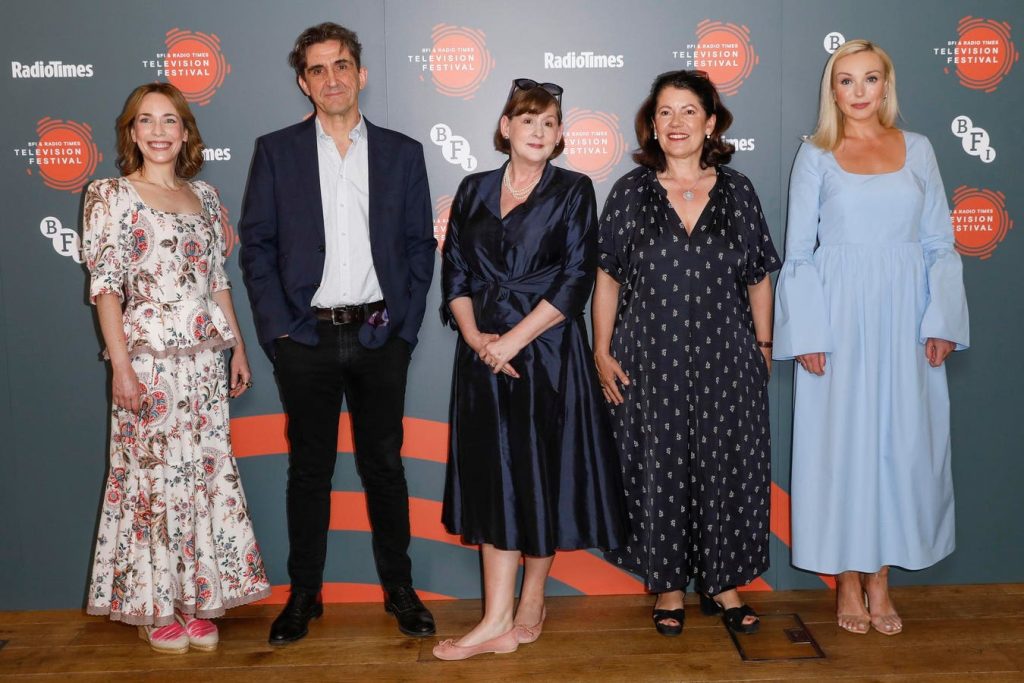The 14th season of the enduringly popular series Call the Midwife, which follows the nurses, midwives and nuns in the East End of London, starts tonight on PBS’ Masterpiece.
LONDON, ENGLAND – MAY 22: Laura Main, Stephen McGann, Heidi Thomas, Pippa Harris and Helen George attend the photocall for “Call the Midwife” during BFI & Radio Times Television Festival at BFI Southbank on May 22, 2022 in London, England. (Photo by Tristan Fewings/Getty Images)
Getty Images
Inspired by the “Call the Midwife” trilogy of Jennifer Worth, who was a midwife and nurse in London from 1953 to 1973, the series tells the stories of the expectant, poor mothers of the East End district of Poplar, who receive the best possible medical care.
According to PBS, the new season “begins in 1970, marking a new decade in Poplar. As chaos unfolds when activists on the Isle of Dogs block access in their bid for independence, Dr. Turner and the midwives must work to keep things running as usual. Meanwhile, the Nonnatus House will continue to tackle social challenges like poor housing, poverty and various health issues, including a puzzling case of apparent immaculate conception.”
In an interview with PBS, Heidi Thomas, creator, writer and executive producer of Call the Midwife, said, ”I think we were all hugely surprised by the popularity of the show. Simply because for a very long time before we started to film it people told us nobody would watch it. They used to say young women will be frightened by it, older women will be disgusted by it, men won’t watch it at all, and I used to think well nobody will watch this show. The very first time it went out we got eight million overnight viewers and I think we were in a sort of shock. But it’s not about the numbers, it’s the passion that people feel for the show.
She continued, “I think what I have come to understand about Call the Midwife – it was never a formula; it was never deliberate – is that it can be enjoyed on a number of levels. If you just want to flop down on a Sunday night and look at Trixie’s frocks, and listen to the lovely music and maybe have a glass of wine and indulge yourself in an escapist treat, you can do that. Or you can dig a little bit deeper looking at the social history, the prejudices that were involved, the difficulties people had before society became as it is today. You can even go down to the deepest level where we are telling stories about the human condition, and you can really engage with that, not just matters of society or medicine, but matters of human existence, life, death and birth. You can dig down as deeply as you want to.”
She added that she has “been amazed by our audience’s capacity for digesting really tough, miserable, gritty, vomiting-over-the-side-of-the-bed childbirth. I think people often think that the shocking thing about Call the Midwife is the violence of childbirth. However, women were subject to other kinds of violence, we’ve shown women being brutalized by men in other ways and interestingly I think sometimes people are much more prepared to have violence against women in particular, sort of wash over them.’
Finally, she said, “We often have people describing how Call the Midwife is an inter-generational viewing experience in their home, and I think that’s lovely. It’s often women watching with their younger sons, for example, it’s not a purely female thing. I love writing about childbirth.
In an interview this week, Laura Main, the actor who portrays nurse Shelagh Turner in the series, said that “diseases don’t go away, unfortunately. So it’s great to be reminded and educated about all sorts of things, health issues.”
She also described the series as “heartwarming, uplifting and funny, seeing this community at work.”

